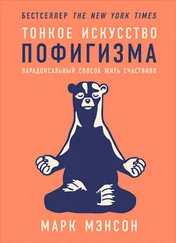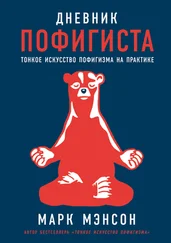Марк Мэнсон - The Subtle Art of Not Giving a F*ck
Здесь есть возможность читать онлайн «Марк Мэнсон - The Subtle Art of Not Giving a F*ck» весь текст электронной книги совершенно бесплатно (целиком полную версию без сокращений). В некоторых случаях можно слушать аудио, скачать через торрент в формате fb2 и присутствует краткое содержание. Год выпуска: 2016, Издательство: HarperCollins, Жанр: Самосовершенствование, на английском языке. Описание произведения, (предисловие) а так же отзывы посетителей доступны на портале библиотеки ЛибКат.
- Название:The Subtle Art of Not Giving a F*ck
- Автор:
- Издательство:HarperCollins
- Жанр:
- Год:2016
- ISBN:нет данных
- Рейтинг книги:5 / 5. Голосов: 2
-
Избранное:Добавить в избранное
- Отзывы:
-
Ваша оценка:
- 100
- 1
- 2
- 3
- 4
- 5
The Subtle Art of Not Giving a F*ck: краткое содержание, описание и аннотация
Предлагаем к чтению аннотацию, описание, краткое содержание или предисловие (зависит от того, что написал сам автор книги «The Subtle Art of Not Giving a F*ck»). Если вы не нашли необходимую информацию о книге — напишите в комментариях, мы постараемся отыскать её.
The Subtle Art of Not Giving a F*ck — читать онлайн бесплатно полную книгу (весь текст) целиком
Ниже представлен текст книги, разбитый по страницам. Система сохранения места последней прочитанной страницы, позволяет с удобством читать онлайн бесплатно книгу «The Subtle Art of Not Giving a F*ck», без необходимости каждый раз заново искать на чём Вы остановились. Поставьте закладку, и сможете в любой момент перейти на страницу, на которой закончили чтение.
Интервал:
Закладка:
CHAPTER 5 You Are Always Choosing
Imagine that somebody puts a gun to your head and tells you that you have to run 26.2 miles in under five hours, or else he’ll kill you and your entire family.
That would suck.
Now imagine that you bought nice shoes and running gear, trained religiously for months, and completed your first marathon with all of your closest family and friends cheering you on at the finish line.
That could potentially be one of the proudest moments of your life.
Exact same 26.2 miles. Exact same person running them. Exact same pain coursing through your exact same legs. But when you chose it freely and prepared for it, it was a glorious and important milestone in your life. When it was forced upon you against your will, it was one of the most terrifying and painful experiences of your life.
Often the only difference between a problem being painful or being powerful is a sense that we chose it, and that we are responsible for it.
If you’re miserable in your current situation, chances are it’s because you feel like some part of it is outside your control—that there’s a problem you have no ability to solve, a problem that was somehow thrust upon you without your choosing.
When we feel that we’re choosing our problems, we feel empowered. When we feel that our problems are being forced upon us against our will, we feel victimized and miserable.
The Choice
William James had problems. Really bad problems.
Although born into a wealthy and prominent family, from birth James suffered life-threatening health issues: an eye problem that left him temporarily blinded as a child; a terrible stomach condition that caused excessive vomiting and forced him to adopt an obscure and highly sensitive diet; trouble with his hearing; back spasms so bad that for days at a time he often couldn’t sit or stand upright.
Due to his health problems, James spent most of his time at home. He didn’t have many friends, and he wasn’t particularly good at school. Instead, he passed the days painting. That was the only thing he liked and the only thing he felt particularly good at.
Unfortunately, nobody else thought he was good at it. When he grew to adulthood, nobody bought his work. And as the years dragged on, his father (a wealthy businessman) began ridiculing him for his laziness and his lack of talent.
Meanwhile, his younger brother, Henry James, went on to become a world-renowned novelist; his sister, Alice James, made a good living as a writer as well. William was the family oddball, the black sheep.
In a desperate attempt to salvage the young man’s future, James’s father used his business connections to get him admitted into Harvard Medical School. It was his last chance, his father told him. If he screwed this up, there was no hope for him.
But James never felt at home or at peace at Harvard. Medicine never appealed to him. He spent the whole time feeling like a fake and a fraud. After all, if he couldn’t overcome his own problems, how could he ever hope to have the energy to help others with theirs? After touring a psychiatric facility one day, James mused in his diary that he felt he had more in common with the patients than with the doctors.
A few years went by and, again to his father’s disapproval, James dropped out of medical school. But rather than deal with the brunt of his father’s wrath, he decided to get away: he signed up to join an anthropological expedition to the Amazon rain forest.
This was in the 1860s, so transcontinental travel was difficult and dangerous. If you ever played the computer game Oregon Trail when you were a kid, it was kind of like that, with the dysentery and drowning oxen and everything.
Anyway, James made it all the way to the Amazon, where the real adventure was to begin. Surprisingly, his fragile health held up that whole way. But once he finally made it, on the first day of the expedition, he promptly contracted smallpox and nearly died in the jungle.
Then his back spasms returned, painful to the point of making James unable to walk. By this time, he was emaciated and starved from the smallpox, immobilized by his bad back, and left alone in the middle of South America (the rest of the expedition having gone on without him) with no clear way to get home—a journey that would take months and likely kill him anyway.
But somehow he eventually made it back to New England, where he was greeted by an (even more) disappointed father. By this point the young man wasn’t so young anymore—nearly thirty years old, still unemployed, a failure at everything he had attempted, with a body that routinely betrayed him and wasn’t likely to ever get better. Despite all the advantages and opportunities he’d been given in life, everything had fallen apart. The only constants in his life seemed to be suffering and disappointment. James fell into a deep depression and began making plans to take his own life.
But one night, while reading lectures by the philosopher Charles Peirce, James decided to conduct a little experiment. In his diary, he wrote that he would spend one year believing that he was 100 percent responsible for everything that occurred in his life, no matter what. During this period, he would do everything in his power to change his circumstances, no matter the likelihood of failure. If nothing improved in that year, then it would be apparent that he was truly powerless to the circumstances around him, and then he would take his own life.
The punch line? William James went on to become the father of American psychology. His work has been translated into a bazillion languages, and he’s regarded as one of the most influential intellectuals/philosophers/psychologists of his generation. He would go on to teach at Harvard and would tour much of the United States and Europe giving lectures. He would marry and have five children (one of whom, Henry, would become a famous biographer and win a Pulitzer Prize). James would later refer to his little experiment as his “rebirth,” and would credit it with everything that he later accomplished in his life.
There is a simple realization from which all personal improvement and growth emerges. This is the realization that we, individually, are responsible for everything in our lives, no matter the external circumstances.
We don’t always control what happens to us. But we always control how we interpret what happens to us, as well as how we respond.
Whether we consciously recognize it or not, we are always responsible for our experiences. It’s impossible not to be. Choosing to not consciously interpret events in our lives is still an interpretation of the events of our lives. Choosing to not respond to the events in our lives is still a response to the events in our lives. Even if you get run over by a clown car and pissed on by a busload of schoolchildren, it’s still your responsibility to interpret the meaning of the event and choose a response.
Whether we like it or not, we are always taking an active role in what’s occurring to and within us. We are always interpreting the meaning of every moment and every occurrence. We are always choosing the values by which we live and the metrics by which we measure everything that happens to us. Often the same event can be good or bad, depending on the metric we choose to use.
The point is, we are always choosing, whether we recognize it or not. Always.
It comes back to how, in reality, there is no such thing as not giving a single fuck. It’s impossible. We must all give a fuck about something. To not give a fuck about anything is still to give a fuck about something.
The real question is, What are we choosing to give a fuck about? What values are we choosing to base our actions on? What metrics are we choosing to use to measure our life? And are those good choices—good values and good metrics?
Читать дальшеИнтервал:
Закладка:
Похожие книги на «The Subtle Art of Not Giving a F*ck»
Представляем Вашему вниманию похожие книги на «The Subtle Art of Not Giving a F*ck» списком для выбора. Мы отобрали схожую по названию и смыслу литературу в надежде предоставить читателям больше вариантов отыскать новые, интересные, ещё непрочитанные произведения.
Обсуждение, отзывы о книге «The Subtle Art of Not Giving a F*ck» и просто собственные мнения читателей. Оставьте ваши комментарии, напишите, что Вы думаете о произведении, его смысле или главных героях. Укажите что конкретно понравилось, а что нет, и почему Вы так считаете.












